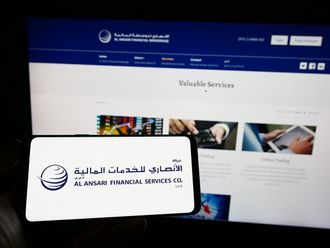Financial services have been transformed by the internet and mobile apps. But what future is there for 6.4m UK adults who have never gone online?
Banking is moving online. Millions of Britons are embracing contactless cards, mobile banking and other consumer-friendly technology, transferring almost £1bn a day over the web. According to the BBA, the industry body, the growth in internet banking is a “seismic change” in the way we manage our finances, help people keep track of their money and save them the time and hassle of queuing in their local branch.
Yet fears are growing that some sections of society are at a serious disadvantage from the relentless migration of financial services to the internet. In the UK, 6.4m adults have never gone online and only 37 per cent of elderly people have used the web, according to the Office for National Statistics.
Just over a year ago, misgivings about the loss of paper-based access to financial services were brought together under the aegis of a new campaign, Keep Me Posted. The organisation presses companies to commit to provide free paper statements and bills to customers.
Judith Donovan, chair of Keep Me Posted and a former postal industry regulator, said that when the internet first became used, there was a presumption that elderly people who did not use it were Luddites, “and when they finally passed away the world would become a perfect digital place”.
But the problem is far more complicated, she says. Aside from disabled and low-income groups who may have difficulties accessing the internet, swaths of the country remain without broadband. The government itself has said that 5 to 10 per cent of the UK will remain permanently beyond the reach of broadband even if it meets its aspirations for widening services, she adds. “More and more people are finding they can’t have the paper bills and statements they need to manage their financial affairs — or they’re having to pay for it.”
Consumers who do not use the internet pay an average £440 more a year for household goods and services or 4.4 per cent of average household income, according to research commissioned by the group.
Gillian Guy, chief executive of Citizens Advice, a charity, said the internet made it easier to cut costs, shop around and make online payments, but these benefits were withheld from those who remained offline.
“It’s not only a lack of internet access which bars people from getting the best deal,” she adds. “People without a bank account face less choice and bigger bills.”
Trains and planes
It’s not just banking; low-cost airlines effectively insist that you check in online and print out your own boarding passes (or have them on smartphones). The best tariffs offered by energy companies invariably presume that you will pay by direct debit, provide your own meter readings and manage your account online. The best deals on train tickets are for those who book ahead on the web.
The numbers of web refuseniks has declined in the past two years, according to research by Oxford Internet Institute; its 2013 report, “Cultures of the Internet”, found that around 18 per cent of the population had never used the internet, down from 23 per cent two years earlier.
It says exclusion from the web appears to be overwhelmingly a matter of choice. When asked why they preferred to be offline, nearly all non-users said they were simply not interested. Retired respondents gave a variant on this response, citing “not for people my age” as a reason to shun the web.
The institute also asked about so-called “proxy use” — where people asked family, friends or fellow workers to use the internet on their behalf. They found rates were very high: nearly 70 per cent of non-users had access to someone who could indirectly get them online.
But it also found that while the use of mobile internet had sharply increased, becoming more integrated with daily life, those who do not use the internet were less likely to get online in future. “Thus the about one-fifth of the population that is not online may become even more excluded. This last 20 per cent will be the most difficult to bring online over the coming years,” the report said.
Lucy Malenczuk, senior policy manager at charity AgeUK, said the extent of the problem, particularly for older people, is likely to be underestimated because possession of internet access was not the same as having the confidence to manipulate finance websites.
“When we’re encouraging people to get online are we providing the right kind of help for them? That means operating online bank accounts safely and securely, having the right kind of antivirus software, keeping passwords safe and having the confidence to know that you’re on the right website,” she says.
Keep Me Posted has also warned about a group that is normally presumed to be the least concerned about the move to online services: the young. Their increasing usage of smartphones means it is harder for them to keep track of their finances, campaigners say, which pushes them faster and deeper into debt.
The weight of paper
Paper still carries a legal weight that can generate practical everyday anomalies in an increasingly web-based world. A copy of a bank statement printed from the web may not be accepted by banks as a legal document: so those hoping to get a mortgage, for instance, may be forced to pay between £2 and £9 for the bank to duplicate its own copy of a statement they have already printed off. “It’s Kafkaesque,” says Donovan.
Progress with the campaign has been less than stellar, however. After a year, only three companies have signed up to the Keep Me Posted pledge: Principality Building Society, the largest building society in Wales, Welsh Water and Wessex Water.
Financial information — not just services — is another facet of exclusion. In the past, those wishing to sign up to a bank account might have walked into the banks in their town, picking up leaflets spelling out the savings rates of each. Such information is now in many cases only to be found online.
However, it’s not always the case that the best rates are offered by online-only accounts. According to figures provided this week by consumer website Moneyfacts, average interest rates for instant access cash individual savings accounts that can be opened in branch, or by phone or post, stands at 1.18 per cent. For those that are exclusively online, the average rate is 1.23 per cent.
Investing offline
Stock broking and fund administration is another area where companies have reaped big cost savings by moving clients online, helped by the increasing use of nominee accounts. Trading over the phone typically costs more and commission is often calculated on an ad valorem basis, rather than the fixed fees that are usual for online bargains. Providers who still offer phone dealing often require other account administration to be done online.
Many investors might previously have avoided these issues by working with a financial adviser, who would administer accounts online but correspond with clients in more traditional ways. However, the retail distribution review has restricted access to financial advice for those unwilling to pay up front for it.
Research conducted for FT Money by the Platforum, an independent consultancy, found that Chelsea Financial Service and Willis Owen offered a good service for those who invest in funds and want offline service, but they do not offer share trading. “Hargreaves Lansdown, Barclays Stockbrokers and Fidelity Personal Investing are all fine for telephone dealing, but charge a bit more for it,” said Jeremy Fawcett, head of direct at the Platforum. “Share Centre is a good option, while Bestinvest are expensive for offline activities; they’re clearly discouraging that sort of client.”
For share dealing alone, one service that might be of interest is Ring 395, operated by Jarvis Investment Management, which offers telephone-only dealing using a geographic number at a flat £3.95 per trade. “We started the service because we were aware of people out there who don’t have a computer, or still want a personal service,” says Nick Crabb, director of business development at Jarvis. Client numbers are “into the thousands”, he adds, and many are older people. The company sends out paper statements in January and tax vouchers in April, but does insist that shares are held in a nominee account. “We could only offer that discounted rate by using the nominee structure.”
But Ring 395 is a rare breed, and by the company’s own admission “something of an experiment”. The overwhelming trend is to online execution and administration.
Malenczuk says these worries will only intensify as the government’s pensions reforms loom into view, giving people the freedom to invest their pension pot as they wish. “We are expecting people to manage their finances actively as they move into retirement, so they have to have the information to make good decisions.”
Financial Times












